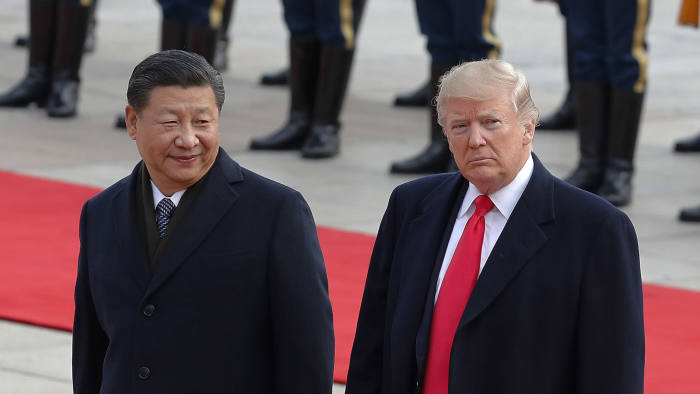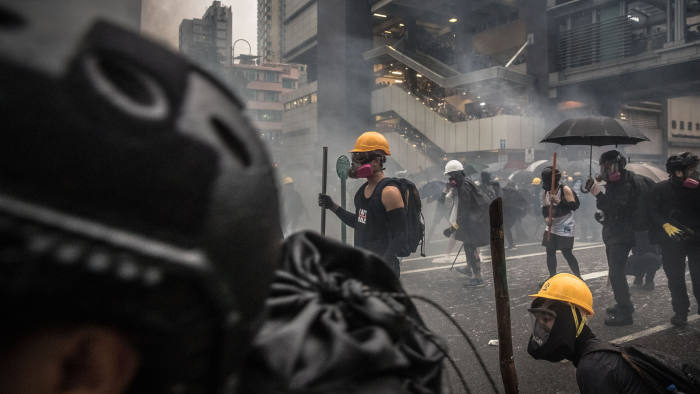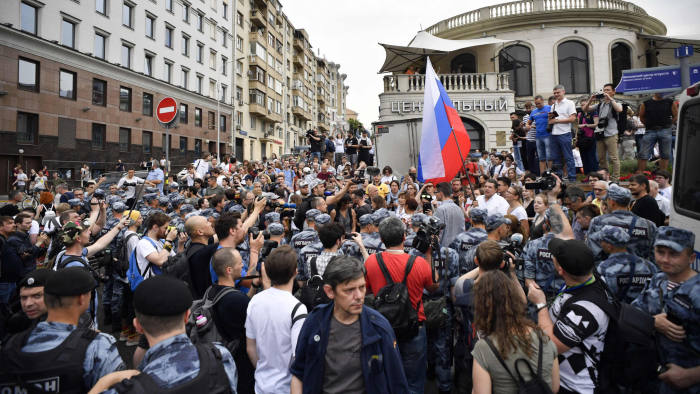The post-1945 rules-based order is being eroded and will never return
Tony Barber

Presidents Xi Jinping of China, left, and Donald Trump of the US. According to Freedom House, both leaders have overseen declines in freedom in their respective countries © Andy Wong/AP
The rise of autocracy and of rightwing populism, its western democratic cousin, gives rise to understandable concern that liberal political values and the rule of law are heading towards terminal decline.
However, neither autocratic states such as China and Russia nor rightwing populist leaders in the US, Italy and other western countries have had everything go their way in 2019.
Their mixed fortunes suggest that it is premature to write off the prospects for global governance, even though the rules-based order constructed after 1945 largely to US specifications is decomposing and will never return in its old form.
In its closely followed annual “Freedom in the World” report, Freedom House, a non-partisan, US government-funded organisation, stated this year that global freedom had shrunk for 13 consecutive years between 2006 and 2018.
During this period, some 116 countries experienced a net decline in freedom and only 63 experienced a net increase, Freedom House said.
The US ranked as a free country, but it trailed France, Germany and the UK as a result of erosions of the rule of law under the Trump administration.
Similar concerns appear in the latest “Rule of Law Index” of the World Justice Project, a Washington-based civil society initiative.
According to this study, limits on governments’ powers, such as independent judiciaries, free media and legislative oversight of executives, have declined significantly in countries such as China, Egypt, Hungary, the Philippines and Turkey.
“One of the most striking things about the degradation of the rule of law is that it is being effected through laws and legal institutions.
The law itself is being hijacked and used to erode checks on power,” says Elizabeth Andersen, WJP’s executive director.

Protestors take part in an anti-government rally in Hong Kong in August 2019 © ROMAN PILIPEY/EPA-EFE/Shutterstock
A no less disturbing trend is the threat to free expression in the form of censorship laws, attacks on independent book publishers and official pressure on scholars who refuse to toe the line.
Ziya Selcuk, Turkey’s education minister, announced in August that President Recep Tayyip Erdogan’s government had removed more than 300,000 books from schools and libraries since a failed 2016 coup and had destroyed them.
Under President Xi Jinping, China’s paramount leader since 2012, the authorities have shut down bookstores that sell material critical of the communist party, turned up pressure on independent academic authors and sealed most access to uncensored information on the internet.
Despite these setbacks for individual liberties, political pluralism and the rule of law, the world’s autocrats and rightwing populist leaders have encountered rising resistance from their countries’ citizens and public institutions in the course of 2019.
Matteo Salvini, leader of Italy’s hard-right League party, lost his jobs as deputy prime minister and interior minister after overestimating his ability to force snap parliamentary elections and become his nation’s undisputed strongman.
Although the League retains more support than other parties, its popularity has tumbled since Mr Salvini’s unsuccessful gambit, which matched his failure to lead a clutch of far-right EU parties to victory in May’s European Parliament elections.
Likewise Donald Trump finds himself in arguably the most serious crisis of his presidency after implicating himself in an attempt to discredit Joe Biden, a former Democratic vice-president and rival in the 2020 presidential race, with the help of a foreign ruler, President Volodymyr Zelensky of Ukraine.
An impeachment inquiry is going ahead in the House of Representatives despite the White House’s refusal to co-operate.
Meanwhile, mass public protests in Hong Kong have evolved over the past seven months from opposition to an extradition law to broader demands that the Chinese government should honour basic democratic rights that it promised to respect after resuming control of the territory in 1997.

Demonstrators gather in Moscow in June 2019 to protest against the apparent impunity of Russia's law enforcement agencies © AFP
Moscow was gripped this year with the largest anti-government demonstrations seen in the Russian capital since the winter of 2011-12.
The spark was the decision of the authorities to ban opposition candidates from standing in city council elections.
In the event, President Vladimir Putin’s ruling United Russia party suffered heavy losses after an opposition campaign that recommended “smart voting”, or votes for any candidates other than self-declared Putin loyalists.
The bigger picture is that Mr Putin’s popularity is falling as a result of public discontent with stagnant living standards, changes to the state pension system, environmental damage, and the high-handed behaviour of the police and security services.
The Chinese and Russian states possess immense resources of violence and intimidation that allow them to suppress dissent with ease, as long as the authorities have the necessary willpower.
China’s Communist party displayed such willpower on Tiananmen Square in 1989 and has never regretted doing so — an unyielding state of mind that augurs badly for the Hong Kong protesters.
However, there is far less tolerance for politically related violence in European societies, as was demonstrated by the public backlash in Slovakia against the murder of Jan Kuciak, an investigative journalist, and his fiancée.
Should rightwing populism fail to make deeper inroads in western political systems, owing to its unrealistic promises and policy confusion when in power, the deliberate disruption of the post-1945 global order would arguably slow down.
This particularly applies to the US, where a transfer of power after the 2020 election might significantly reduce the White House’s hostility and scepticism about multilateral global institutions.
The growing internal challenges of autocratic systems in countries such as Russia and Turkey might reinforce this trend.
However, the most important long-term trends in international relations over the past 30 years have been the rise of China and the accelerating shift of economic power from the west to the Asia-Pacific region.
This in itself ensures that the Washington-designed post-1945 order, built mainly for the benefit of the US, Europe, Japan and their allies, will give way to a more dispersed form of global governance.
For the west, the cold reality is not that autocracy will triumph and democracy will fail, but rather that the 500-year-long era of western global supremacy is coming to an end.
0 comments:
Publicar un comentario